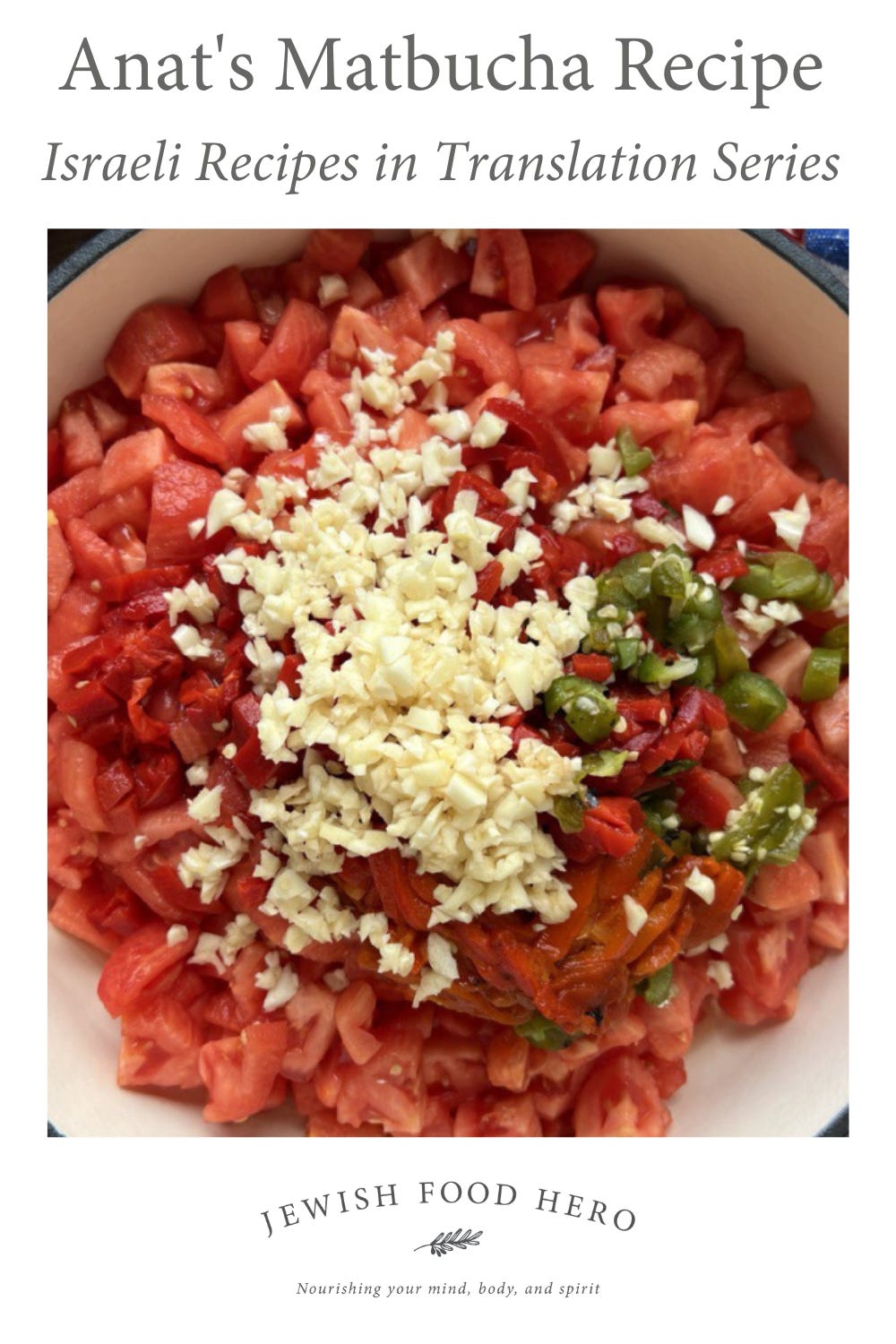Anat Elisha’s Matbucha Recipe
Israeli Recipes in Translation Series
Israeli Recipes in Translation is a monthly series that brings authentic Israeli recipes—often shared only in Hebrew—into English. Each recipe is carefully selected and translated to help bridge the gap between Israeli home kitchens and readers in the diaspora. Alongside each dish, I’ll share its cultural context, seasonal significance, or the personal story behind it. This is my way of staying connected to Israel—and inviting you to do the same, one recipe at a time.
Matbucha (מטבוחה)
In Israeli cuisine, salatim (סלטים)—which literally means "salads" in Hebrew—refers not just to leafy greens, but to a colorful array of mezze-style small dishes served at the start of a meal. Often closer to spreads, dips, and pickled vegetables than what we typically think of as salad in the U.S. or Europe, salatim are an essential part of Shabbat and holiday meals in many Israeli homes.
It’s not uncommon to see 12, 14, even 18 small plates of salatim spread across the table, each inviting a scoop with fresh challah. With so many flavors to sample, it’s a wonder anyone has room left for the main course!
First up: Matbucha—a rich, slow-cooked blend of tomatoes, peppers, garlic, and spices that’s a staple on many Shabbat tables.
A beloved North African salat with jammy tomatoes, roasted peppers, and garlic
Matbucha (which means “cooked” in Arabic) is one of the most iconic of the salatim—a staple at Israeli Shabbat tables and mezze spreads. Originating in North African Jewish communities, particularly Moroccan and Libyan, this deeply flavored tomato-and-pepper dish is simmered slowly until it becomes thick, rich, and glossy—almost like a savory jam.
So does this mean that when Jews immigrated to Israel as refugees from Morocco and Libya, they brought this recipe with them—and now it’s a staple in Israeli cuisine? It seems so.
It’s a must-have in many homes for Friday night dinner, right alongside challah, hummus, and tahini. The slow cooking process brings out the natural sweetness of the tomatoes, the smokiness of roasted peppers, and the mellow depth of garlic.
This recipe comes from Anat Elisha, who shares her family’s treasured version passed down from her Moroccan mother. Anat calls it “matbucha jam,” and once you try it, you’ll understand why.
Anat Elisha’s Matbucha Recipe
From the website, Anat Elisha’s Kitchen: Imagination and Creativity in the Kitchen
“I grew up in a Moroccan home whose entire essence was food. Every small event became a food festival. My late mother was a cook and baker, and my late father loved food more than anything in life. Everyone who came through our door sat down to eat. My mother worked magic in the kitchen.
I have memories from a very young age, and they helped shape who I am today. If someone asks me who I am, I immediately say: Anat Elisha is a cook of memories.”
“It’s not Friday night dinner without matbucha! In fact, I call my matbucha ‘matbucha jam’. Why? Because I roast the peppers on the gas burner before adding them to the tomatoes, and after a long time cooking them as befits matbucha, it reaches a jammy texture.
I make my matbucha exactly like my late mother did. I haven't changed a thing, including the method of preparation, except for the way I peel the tomatoes. My mother used to score the skin of the tomatoes and soak them in boiling water, and indeed the skin lifts off in seconds with this method. I peel them with a serrated knife, thus saving myself more dishes.”
Ingredients
12–15 medium ripe tomatoes, peeled and diced
(Use a serrated knife or score the skins and soak in boiling water for easy peeling.)2–3 roasted chili peppers, peeled and chopped - (After roasting, peel the chili and red bell peppers before chopping them)
(Adjust to your preferred level of heat.)2 roasted red bell peppers, peeled and chopped
10 cloves garlic, peeled and chopped
Seasoning:
1½ tablespoons sweet paprika
1 teaspoon sugar
1 tablespoon salt
½ cup canola oil
Instructions
1. Combine the base ingredients.
Place the diced tomatoes, roasted chili peppers, roasted bell peppers, and garlic in a heavy-bottomed pot (cast iron recommended). Add the teaspoon of sugar.
2. Begin the slow simmer.
Cook over low heat for about 40 minutes, stirring occasionally to prevent sticking. The tomatoes will release their juices—this is expected.
3. Mash the vegetables.
Use a wooden spoon or potato masher to break down the mixture into a thick, saucy consistency.
4. Add the seasoning.
In a small bowl, mix together the paprika, salt, and canola oil. Stir this mixture into the pot.
5. Simmer until jammy.
Continue cooking on low heat for an additional 40 minutes, stirring every 10 minutes. The mixture should become thick, glossy, and “jam-like.” The slow cooking is what transforms matbucha from a tomato stew into something rich and spreadable.
Tips & Serving Suggestions
Serve at room temperature with fresh challah, pita, or any crusty bread.
Pairs beautifully with tahini, labneh, or hummus.
Keeps well in the fridge for up to a week and actually tastes even better the next day as the flavors meld.
Try it spooned over grilled fish, as a sandwich spread, or as a topping for roasted eggplant.
I love the Israeli Recipes in Translation series and hope you do too. These recipes help us feel connected to Israel during these difficult times—through flavor, memory, and tradition. Try this matbucha and share it with someone you love.
To our Health & Inspiration
Kenden











love all the recipes here that taste even better the next day
I don’t have a gas burner, so I would roast the peppers and chilies under the broiler in the oven, I think. But are they roasted with or without skin?